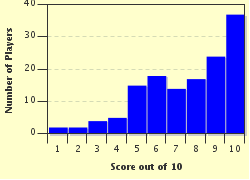Quiz Answer Key and Fun Facts
1. In what New Testament book of the Bible can you find out about a woman named Tabitha who was raised from the dead by Simon Peter?
(She was also known by the name Dorcas, as well.)
2. Stephen was an apostle of Jesus whom some of his fellow countrymen stoned to death, while a future apostle looked on in approval. Who was the man who wholeheartedly approved the murder of Stephen, only to later become convicted of his wrongdoings by God and then became an apostle himself?
3. Ruth's story is one that involved her entering into a relationship with a wealthy relative of her deceased husband. She later married this man named Boaz, and they had a child. What was his name?
4. Esther is a book in the Old Testament. In this saga, who was the arch enemy of Esther and her relative, Mordecai?
5. Joseph was given a coat of many colors, as a sign of favor. Who was responsible for this gift to him?
6. One of Moses' key leaders led a battle in a city called Jericho. This battle occurred after the death of Moses, but was quite successful because God led the battle and this man followed the instructions that he had been provided by God.
What was his name?
7. When Samuel anointed David as the second king of Israel, how did he know which son of Jesse was to be the next king, chosen by God to replace Saul as leader of Israel?
8. A man named Nicodemus once met with Jesus by night. What question did he ask of Jesus?
9. What type of creature did the prophet Jonah have a problem with, near the end of the book of Jonah?
10. A man who made a foolish, unthinking vow to God that God had not required of him lived to regret his error. Jephthah was a bit excited and exhilarated as he went into battle and in a moment of brash bravado promised God that he would offer a burnt offering of the first thing that came out of his house upon his return. What did Jephthah eventually have to sacrifice, due to his own words?
Source: Author
logcrawler
This quiz was reviewed by FunTrivia editor
agony before going online.
Any errors found in FunTrivia content are routinely corrected through our feedback system.

